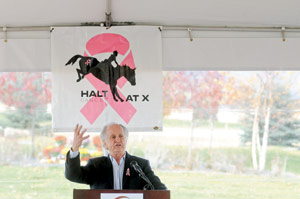On Oct. 19, Sarah Broussard-Kelly stood in a small, warm pavilion tent at Rebecca Farm and told an audience she was nervous. No one could blame her; jumpy nerves are just one of the emotions when you get to see a dream come true.
That’s what happened that day, as Broussard-Kelly handed over three checks from her Halt Cancer at X organization totaling $65,000 to different programs bent on overcoming the disease.
“It’s a very exciting day here at Rebecca Farm and for breast cancer research and for the local community,” she said.
Rebecca Farm, named for Broussard-Kelly’s mother Rebecca “Becky” Broussard, is the epicenter for equestrian eventing in the Northwest United States. Broussard-Kelly decided to combine this aspect of her life with another important facet: raising awareness and funds for breast cancer research.
Her mother passed away after a battle with the disease in 2010, and Broussard-Kelly wanted to contribute to the fight against breast cancer in the most effective way she could. As the organizer of The Event at Rebecca Farm, one of the pre-eminent equestrian triathlons in the world, it struck her that she should just combine those two pieces of her life.
So last year she created Halt Cancer at X, which is named after a dressage term. Admission to The Event is free, but organizers collected a $5 parking donation. Competitors also joined in, raising money through pledges and a Calcutta auction.
In total, the program raised $45,000 through donations and $20,000 from a Montana Equestrian Events grant.
“It was an astounding response,” Broussard-Kelly said.
The largest donation – $50,000 – went to a research project being conducted by Dr. Mario Cappechi, the distinguished professor of human genetics and biology at the University of Utah and 2007 winner of the Nobel Prize in Physiology or Medicine. Also involved in the project are Dr. Elizabeth Blackburn, professor in biology and physiology at the University of California – San Francisco and recipient of the 2009 Nobel Prize in Physiology or Medicine; and Simon Titen, Ph.D.
The money will be used to support the research and purchase the supplies and materials needed to implement the experiments involved in the “targeting telomeres to identify novel therapeutic treatments of breast cancer” project.
According to the Halt Cancer at X, this project will “help determine how perturbation of single chromosome telomere is handled by human breast cancer cells. Telomeres are protective structures composed of DNA and protein that function at the end of all known linear chromosomes. Answers to this query should provide the means to more effectively manage breast cancer malignancy.”
Cappechi spoke after receiving the check on Oct. 19, and said the recession has made it difficult to raise money for research projects. The $50,000 from Halt Cancer at X will help their project get off the ground, he said.
Cancer research can be limited by a lack of money, but it is also important to keep an open mind and allow for fresh ideas, he said, which he believes describes this project. Research projects are extremely important in the fight against cancer, he added.
 |
|
Dr. Mario Capecchi speaks at the Halt Cancer at X event at Rebecca Farm after accepting a $50,000 grant that will help in cancer research. Capecchi was a winner of The Nobel Prize in Physiology or Medicine in 2007. Lido Vizzutti | Flathead Beacon |
“It’s an ongoing battle, but I think we’re going to win it,” Capecchi said.
Broussard-Kelly said she is proud to support cancer research, but also wanted to help organizations dealing with those who have already been diagnosed. For that reason, she gave a $7,500 check to the Kalispell Regional Hospital Foundation Paul Bass Fund’s One2One for Cancer Survivors scholarship program.
One2One provides a personal experience for these survivors, giving them the skills to live healthier lives in terms of diet and exercise, which reduces the risk of cancer recurrence.
Another $7,500 went toward the production of a cancer video series to give recently diagnosed patients a resource of information about what to expect to take home and review.
It was a short ceremony, but the three checks represented a world of emotions for those involved; they were a dream realized, a compassionate, helping hand and, perhaps the most important of all, a strand of hope for the future.
And Broussard-Kelly isn’t finished.
“Next year we’re upping the ante,” she said. “This is not it.”